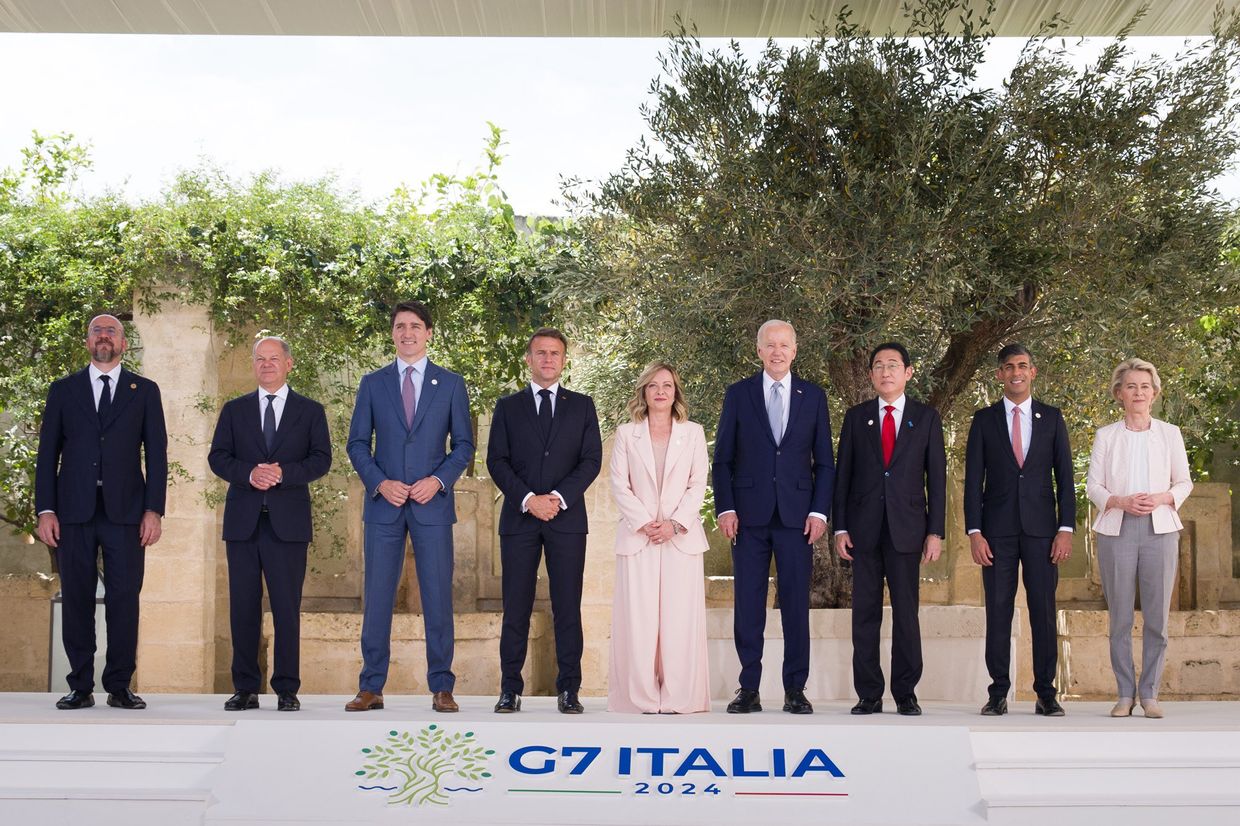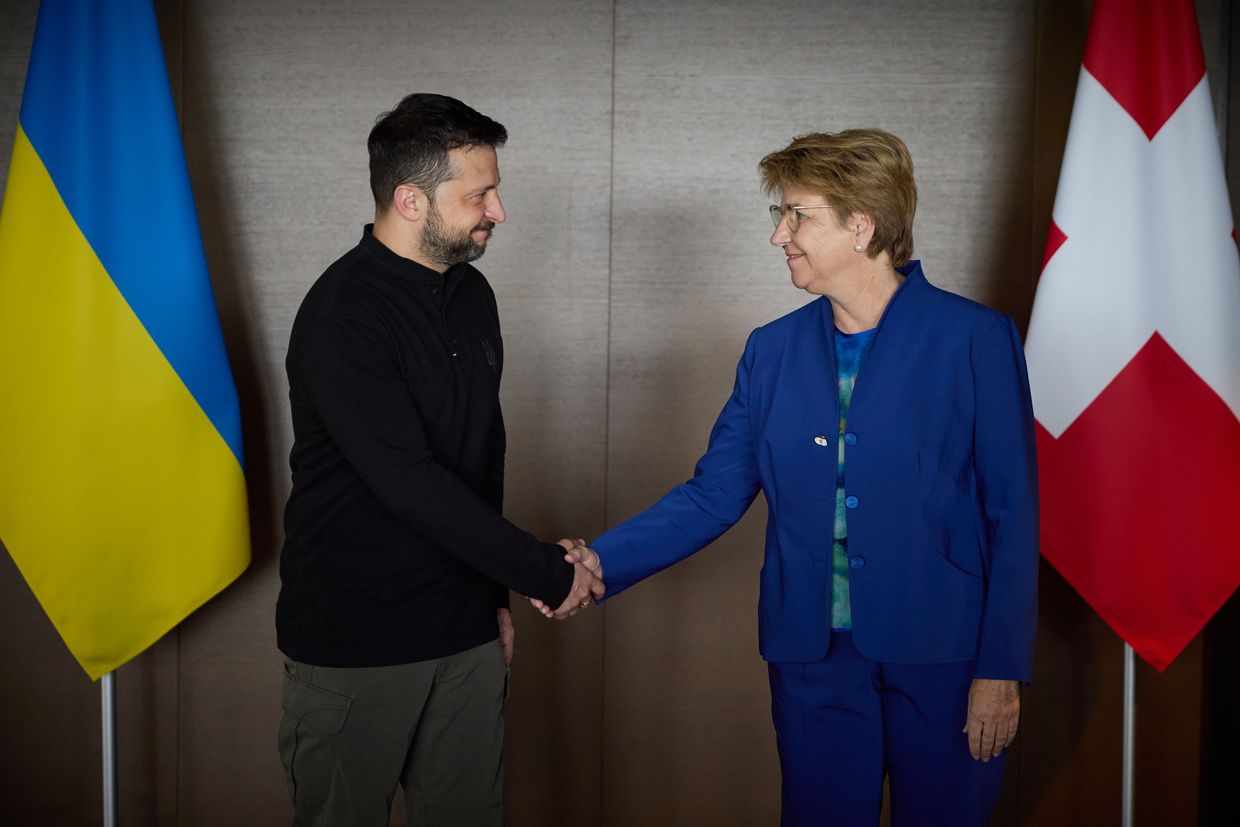Ukraine-US 10-year security deal: 5 key takeaways

U.S. President Joe Biden attends a press conference with President Volodymyr Zelensky at the Masseria San Domenico on the sidelines of the G7 Summit hosted by Italy in Apulia region, on June 13, 2024 in Savelletri. (Filippo Monteforte/AFP via Getty Images)
Less than a month ahead of NATO's Washington summit, President Volodymyr Zelensky and his American counterpart Joe Biden signed a long-awaited bilateral security agreement on the sidelines of the Group of Seven (G7) summit in Italy.
The 10-year deal became Ukraine's 17th one concluded under the G7 Joint Declaration of Support. The U.S. joined other countries, including the U.K., Germany, and France, that have signed similar bilateral treaties to help Kyiv repel Russia's ongoing full-scale invasion.
At least 10 more agreements are yet to be signed.
"The philosophy of our security agreement is, in fact, the philosophy of the alliance. And that is why the issue of NATO is covered through the text of the agreement," Zelensky said.
Unlike NATO, it doesn't require an American military response if Ukraine is attacked — in this case, the parties should meet within 24 hours. The deal also does not outline new prospects for Ukraine to join NATO.
As a part of a long-term effort, Washington will help to develop Ukraine's Armed Forces by training, expanding cooperation in the production of weapons and equipment, providing military aid, and enhancing intelligence sharing.
Here are the five things to know about the first official security agreement between Ukraine and the U.S.
Unprecedented or mundane?
The agreement "clearly states that America supports Ukraine's efforts to win this war," Zelensky said, describing the deal as a "bridge" to Ukraine's future NATO membership.
The text states that the U.S. "commits to support Ukraine in developing a modern, NATO-interoperable force that can credibly deter and, if necessary, defend against future aggression," including developing Ukraine's air and missile defense, cybersecurity, and maritime capabilities.
The U.S. also commits to working toward procurement of squadrons of modern fighter aircraft, "including, but not limited to, F-16s," according to the text.
Described by Zelensky as "unprecedented," the pact with Washington is an executive agreement, which means that it is signed by the U.S. president and has the force of law.

Ihor Zhovkva, deputy head of the President's Office, said that in legal terms, the deal with the U.S. is "the strongest" of the 17 security agreements that Kyiv has signed with other nations.
Oleksandr Kraiev, an expert on North American policy at the foreign policy think tank Ukrainian Prism, doubts that the deal is unparalleled, calling it "less provocative."
"We expected it to be an indicator of American leadership, some real, powerful measures to ensure our security, investments, and accession to NATO. But in my opinion, it looks less radical than even the agreement with the British," he told the Kyiv Independent.
U.K. Prime Minister Rishi Sunak visited Kyiv on Jan. 12 and announced a 2.5-billion-pound ($3.2 billion) military aid package. Sunak and Zelensky also signed a new deal on security cooperation, the first bilateral commitment finalized as part of the security assurances announced by the Group of Seven (G7) last July.
Zelensky also called the deal "unprecedented" and said that this day "entered the history of our state."
Non-military cooperation and reforms
In addition to defense and security cooperation, the U.S. and Ukraine agreed to work on economic recovery and reforms.
This includes supporting Ukraine's energy security and its vision of a modern and decentralized energy system integrated with Europe, as well as seeking opportunities to provide technical assistance to support the country's economic needs stemming from Russia's war.
The parties also aim to work on projects to support Ukrainian and American economic development in the areas of defense production and infrastructure.
A separate article of the deal is devoted to Ukraine's institutional reforms in accordance with democratic principles and EU and NATO standards.
Kyiv should make efforts to finalize the judicial reform, implement "robust" anti-corruption measures, and strengthen the rule of law through reforms in law enforcement, security, tax, and customs institutions.
Judicial reform has been a major stumbling block for Ukraine.
Following years of attempting to reboot Ukraine's judicial system, the ongoing selection of new Constitutional Court judges under new rules is in its final stages – the judges have already been chosen and need to be formally appointed.
"Compared with previous contests, it's a big step forward," Mykhailo Zhernakov, head of judicial watchdog Dejure, told the Kyiv Independent.
NATO membership
Kyiv has voiced hope that NATO's July summit in Washington will bring a more definite signal about Ukraine's future membership in the alliance.
However, American officials made it clear that the country is unlikely to receive an invitation.
In his latest remarks, Biden said that he had not been prepared to support the "NATOization of Ukraine before," but according to the deal, the parties recognize it "as supporting a bridge to Ukraine's eventual membership in NATO."
If and when security conditions allow, Kyiv and Washington also plan to consult on possible training and exercise programs in Ukraine, the deal read.
In addition, Ukraine commits to incorporating NATO doctrine and combined arms concepts at all levels of its security and defense forces and ensuring the proper use and support of new capabilities.
Since the start of Russia's war against Ukraine in 2014, Kyiv has been attempting to modernize its Armed Forces and bring up its doctrine to NATO standards. Ukraine has also gradually moved from using Soviet-made arms to those made in accordance with NATO standards.
More than 110 models of Ukrainian and foreign-made military vehicles have been approved for use in the Armed Forces of Ukraine since March 2022, Ukraine's Defense Ministry said on June 8.
Undefined victory
The U.S. and Ukraine will work to achieve "a just and sustainable peace" that respects Ukraine's rights under international law, including its sovereignty and territorial integrity. The pact also mentions that Russia must be held accountable.
Due to security commitments, Washington seeks "to support Ukraine's efforts to win today's war and deter future Russian aggression."
According to Zhovkva, this is the first time that "Ukraine's victory" is put into writing. However, the agreement doesn't mention the restoration of Ukraine's territorial integrity as a clear goal, opening the clause to interpretation.
Kraiev said that the strategy of how continued U.S. support will advance a Ukrainian victory should be determined. The plan, which the Biden administration is to submit to several congressional committees, was mentioned in the aid bill passed in late April, which provided close to $61 billion for Kyiv.
"The deadline is expiring. And this should tell us what exactly this definition in the document means and how these weapons will be provided," the expert said.
Termination
Both Kyiv and Washington can terminate the agreement. One of the parties must provide written notice, and the termination takes effect six months after that.
If Donald Trump is re-elected, the deal's fate appears unclear. A presumptive Republican nominee for the upcoming 2024 U.S. presidential election has repeatedly said he could end Russia's war within 24 hours if elected president, without specifying the steps for reaching a peace deal between Kyiv and Moscow.
"If Trump is inaugurated at noon on Jan. 20 next year, by about five in the afternoon, he could have dissolved this agreement in its entirety," John Bolton, a former national security adviser to Trump, told CNN.
Kraiev said there are two ways to prevent this. One is to submit the agreement to Congress for approval.
The deal also envisages that any additional agreement concluded within the framework of this one will continue to be valid even if the initial pact is canceled.
"Therefore, all additional agreements on financing, weapons transfers, and training will be formalized in separate agreements. And even if this deal is eventually terminated, all the other clauses of this agreement will continue to be valid in separate agreements," Kraiev told the Kyiv Independent.












